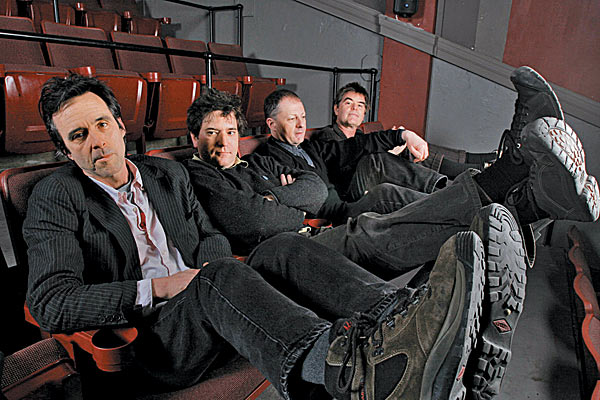
Kendra Atleework
On Friday, November 13th, Clint Conley (bass, vocals) of MOB did an interview on Hopscoth with DJ Special K (Friday nights 8-10). That Sunday they played to a packed Echo in celebration of their new album.
Clint Conley’s eyes roll back in his head. He bends in two. His fingers stiffen. Frosty gray hair flies into his eyes and an electric bass shrieks in his arms, its white paint rubbed away by night after night of sonic battery.
He grabs the mic and lunges into the chorus of “Academy Fight Song.” Guitarist Roger Miller and drummer Peter Prescott are at his side, but right now all eyes are on Conley.
It was 1979 when he first took the stage as cofounder of Boston post-punk band Mission of Burma. “It was absolutely terrifying,” says Conley of his first performance. “We had no idea what we were doing.”
Mission of Burma disbanded in 1983, reuniting 19 years later in 2002. In the interim they have been featured in dozens of music books, and are credited with influencing giants in the independent music scene. Their native city of Boston has named October 4th “Mission of Burma Day”, and they are revered in college radio stations across the country.
Conley never expected such acclaim. “It was pretty early on that we realized that at best we were going to be a limited taste,” he says. “But the music we made back then still seems to resonate with people.”
Many bands that reunite after a long break are accused of milking the legacy. Conley says he believes Mission of Burma have escaped that certain fate (no pun intended). “It’s not like we’re trying to relive some long lost glory, since we never really had that,” he says. “We’re just doing what feels fun.”
It’s a Sunday night and Mission of Burma have drawn around 100 people to the Echo, a small venue in downtown LA. A few college students speckle a crowd that is otherwise leaning towards 50. Conley stands onstage in the low red lighting. His jeans have ripped over one knee. He adjusts the buttons on a wrinkly blue shirt and smiles at the audience.
He recalls a much more hostile reception when Mission of Burma first took on the Boston scene with their explosive live shows. “When we first played, people heard a lot of noise, a lot of feedback from Roger’s guitar, Peter killing his symbols… it was a very unpleasant sound for a lot of people,” he says. “We haven’t changed our attack much, but the culture at large is more attuned to that kind of sonic assault.”
Mission of Burma may not have changed their style, but they have learned a lot. “We’re singing and playing better,” says Conley. “That feels good, it feels more muscular, stronger.”
After three encores, the band concludes the night with 1982’s aggressive “Learn How”. Conley pulls out vinyl, CDs, and T-shirts, turning the stage into a merch booth. The audience rushes to greet him. “It’s a really privileged position to be in to be able to play music and travel around,” hey says, shaking hands warmly with a college student in the audience. “It’s ridiculously fun.”
